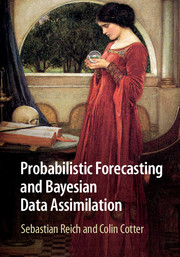Book contents
- Frontmatter
- Contents
- Preface
- 1 Prologue: how to produce forecasts
- Part I Quantifying Uncertainty
- Part II Bayesian Data Assimilation
- 6 Basic data assimilation algorithms
- 7 McKean approach to data assimilation
- 8 Data assimilation for spatio-temporal processes
- 9 Dealing with imperfect models
- A postscript
- References
- Index
9 - Dealing with imperfect models
from Part II - Bayesian Data Assimilation
Published online by Cambridge University Press: 05 May 2015
- Frontmatter
- Contents
- Preface
- 1 Prologue: how to produce forecasts
- Part I Quantifying Uncertainty
- Part II Bayesian Data Assimilation
- 6 Basic data assimilation algorithms
- 7 McKean approach to data assimilation
- 8 Data assimilation for spatio-temporal processes
- 9 Dealing with imperfect models
- A postscript
- References
- Index
Summary
Recall from our discussion in the Preface that Laplace's demon possessed (i) a perfect mathematical model of the physical process under consideration, (ii) a snapshot of the state of that process at an arbitrary point in the past or the present, and (iii) infinite computational resources to unravel explicit solutions of the mathematical model. In Chapter 1 we discussed these aspects in a very simplified mathematical setting where physical processes were reduced to one set of mathematical equations (the surrogate physical process) and the mathematical model was represented by a system of difference equations. We also discussed partial and noisy observations of state space as presentations of our knowledge about the surrogate physical process, and briefly touched upon the issue of numerical approximation errors, which arise from putting a mathematical model into algorithmic form amenable to computer implementations. However, contrary to these general considerations made in Chapter 1, we have mostly limited the discussion of data assimilation algorithms in Chapters 6 to 8 to an even more simplified setting where the mathematical model is assumed to be a perfect replica of the surrogate physical process. In other words, the same model has been used both for generating the surrogate physical process and for making predictions about this process. We also generally assumed that the mathematical models come in algorithmic form and discretisation errors were discarded. This setting is called an ideal twin experiment. Within a perfect model setting, uncertainty only arises from incomplete knowledge of the model's initial state. A slight generalisation of this perfect model scenario arises when the surrogate physical process is a particular realisation of the stochastic difference equation which is used for producing forecasts. In that case, forecast uncertainties are caused by the unknown distribution of initial conditions and the unknown realisations of the stochastic contributions to the evolution equation.
In this chapter, we will discuss how to deal with imperfect models and parameter dependent families of imperfect models from a Bayesian perspective. Again our situation will be simplified by the assumption that the underlying reference solution is generated by a known computational model.
- Type
- Chapter
- Information
- Probabilistic Forecasting and Bayesian Data Assimilation , pp. 259 - 287Publisher: Cambridge University PressPrint publication year: 2015

